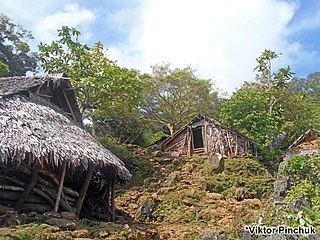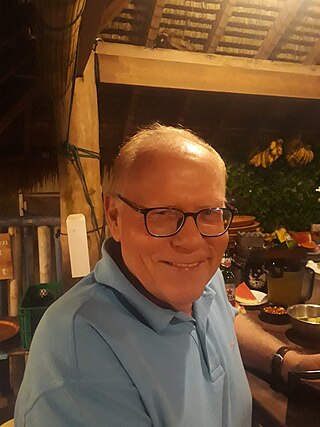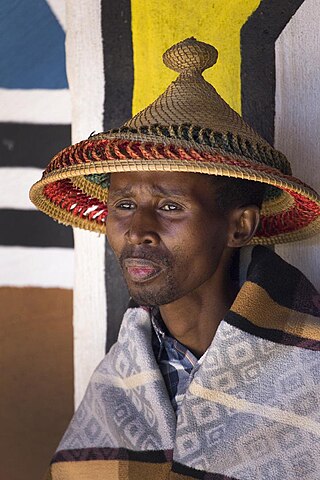
Initiation is a rite of passage marking entrance or acceptance into a group or society. It could also be a formal admission to adulthood in a community or one of its formal components. In an extended sense, it can also signify a transformation in which the initiate is 'reborn' into a new role. Examples of initiation ceremonies might include Christian baptism or confirmation, Jewish bar or bat mitzvah, acceptance into a fraternal organization, secret society or religious order, or graduation from school or recruit training. A person taking the initiation ceremony in traditional rites, such as those depicted in these pictures, is called an initiate.

Coming of age is a young person's transition from being a child to being an adult. The specific age at which this transition takes place varies between societies, as does the nature of the change. It can be a simple legal convention or can be part of a ritual or spiritual event, as practiced by many societies. In the past, and in some societies today, such a change is associated with the age of sexual maturity (puberty), especially menarche and spermarche. In others, it is associated with an age of religious responsibility. Particularly in Western societies, modern legal conventions that stipulate points at around the end of adolescence and the beginning of early adulthood when adolescents are generally no longer considered minors and are granted the full rights and responsibilities of an adult are the focus of the transition. In either case, many cultures retain ceremonies to confirm the coming of age, and coming-of-age stories are a well-established sub-genre in literature, film industry, and other forms of media.

Maurice Godelier is a French anthropologist who works as a Director of Studies at the School for Advanced Studies in the Social Sciences. He is one of the most influential French anthropologists and is best known as one of the earliest advocates of Marxism's incorporation into anthropology. He is also known for his field work among the Baruya in Papua New Guinea from the 1960s to the 1980s.
The Fore people live in the Okapa District of the Eastern Highlands Province, Papua New Guinea. There are approximately 20,000 Fore who are separated by the Wanevinti Mountains into the North Fore and South Fore regions. Their main form of subsistence is slash-and-burn farming. The Fore language has three distinct dialects and is the southernmost member of the East Central Family, East New Guinea Highlands Stock, Trans–New Guinea phylum of Papuan languages.

The Asmat are an ethnic group of New Guinea, residing in the province of South Papua, Indonesia. The Asmat inhabit a region on the island's southwestern coast bordering the Arafura Sea, with lands totaling approximately 18,000 km2 (7,336 mi2) and consisting of mangrove, tidal swamp, freshwater swamp, and lowland rainforest.

Bunlap is a village in the south-east of Pentecost Island in the Pacific archipelago of Vanuatu. It is the most well-known of a number of local kastom (custom) villages whose people aspire to retain a traditional lifestyle with minimal Western influences.

Gilbert H. Herdt is Emeritus Professor of Human Sexuality Studies and Anthropology and a Founder of the Department of Sexuality Studies and National Sexuality Resource Center at San Francisco State University. He founded the Summer Institute on Sexuality and Society at the University of Amsterdam (1996). He founded the PhD Program in Human Sexuality at the California Institute for Integral Studies, San Francisco (2013). He conducted long term field work among the Sambia people of Papua New Guinea, and has written widely on the nature and variation in human sexual expression in Papua New Guinea, Melanesia, and across culture.

Bora is an initiation ceremony of the Aboriginal people of Eastern Australia. The word "bora" also refers to the site on which the initiation is performed. At such a site, boys, having reached puberty, achieve the status of men. The initiation ceremony differs from Aboriginal culture to culture, but often, at a physical level, involved scarification, circumcision, subincision and, in some regions, also the removal of a tooth. During the rites, the youths who were to be initiated were taught traditional sacred songs, the secrets of the tribe's religious visions, dances, and traditional lore. Many different clans would assemble to participate in an initiation ceremony. Women and children were not permitted to be present at the sacred bora ground where these rituals were undertaken.
The Rikbaktsa are an indigenous ethnic group from the Mato Grosso region of Brazil.

Semen, also known as seminal fluid, is an organic bodily fluid created to contain spermatozoa. Spermatozoa are secreted by the male gonads and other sexual organs of male or hermaphroditic animals and can fertilize the female ovum. Semen is produced and originates from the seminal vesicle, which is located in the pelvis. The process that results in the discharge of semen from the urethral orifice is called ejaculation. In humans, seminal fluid contains several components besides spermatozoa: proteolytic and other enzymes as well as fructose are elements of seminal fluid which promote the survival of spermatozoa and provide a medium through which they can move or "swim". The fluid is adapted to be discharged deep into the vagina, so the spermatozoa can pass into the uterus and form a zygote with an egg.
The Etoro, or Edolo, are a tribe and ethnic group of Papua New Guinea. Their territory comprises the southern slopes of Mt. Sisa, along the southern edge of the central mountain range of New Guinea, near the Papuan Plateau. They are well known among anthropologists because of ritual acts practiced between the young boys and men of the tribe. The Etoro believe that young males must ingest the semen of their elders to achieve adult male status and to properly mature and grow strong.
Gender systems are the social structures that establish the number of genders and their associated gender roles in every society. A gender role is "everything that a person says and does to indicate to others or to the self the degree that one is either male, female, or androgynous. This includes but is not limited to sexual and erotic arousal and response." Gender identity is one's own personal experience with gender role and the persistence of one's individuality as male, female, or androgynous, especially in self-awareness and behavior. A gender binary is one example of a gender system.
The Simbari people are a mountain-dwelling, hunting and horticultural tribal people who inhabit the fringes of the Eastern Highlands Province of Papua New Guinea, and are extensively described by the American anthropologist Gilbert Herdt. The Sambia – a pseudonym created by Herdt himself – are known by cultural anthropologists for their acts of "ritualised homosexuality" and semen ingestion practices with pubescent boys. In his studies of the Simbari, Herdt describes the people in light of their sexual culture and how their practices shape the masculinity of adolescent Simbari boys.
Simbari or Chimbari, is an Angan language of Papua New Guinea.
Homosexuality in Indonesia is generally considered a taboo subject by both Indonesian civil society and the government. Public discussion of homosexuality in Indonesia has been inhibited because human sexuality in any form is rarely discussed or depicted openly. Traditional religious mores tend to disapprove of homosexuality and cross-dressing.

Papua New Guinea (PNG) is often labelled as potentially the worst place in the world for gender-based violence.

Ulwaluko, traditional circumcision and initiation from childhood to adulthood, is an ancient initiation rite practised by the Xhosa people, and is commonly practised throughout South Africa. The ritual is traditionally intended as a teaching institution, to prepare young males for the responsibilities of manhood. Therefore, initiates are called abakhwetha in isiXhosa: aba means a group, and kwetha means to learn. A single male in the group is known as an umkhwetha. A male who has not undergone initiation is referred to as inkwenkwe (boy), regardless of his age, and is not allowed to take part in male activities such as tribal meetings.
The concept of toxic masculinity is used in academic and media discussions to refer to those aspects of hegemonic masculinity that are socially destructive, such as misogyny, homophobia, and violent domination. These traits are considered "toxic" due in part to their promotion of violence, including sexual assault and domestic violence. Socialization of boys sometimes also normalizes violence, such as in the saying "boys will be boys" about bullying and aggression.

Lebollo la banna is a Sesotho term for male initiation.
A sexual rite of passage is a ceremonial event that marks the passage of a young person to sexual maturity and adulthood, or a widow from the married state to widowhood, and involves some form of sexual activity.










